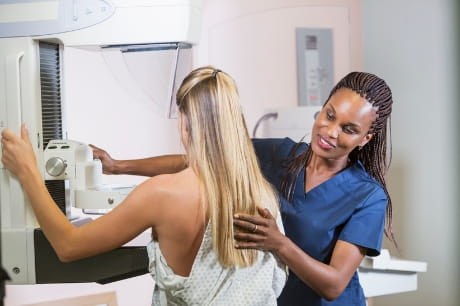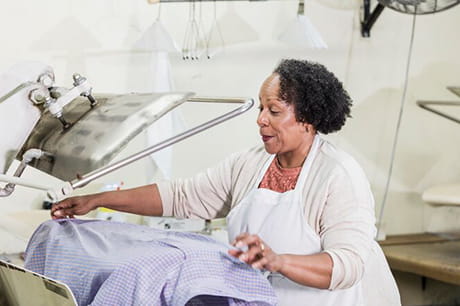Breast health care

Your best breast health
From routine mammograms to breast cancer treatment, we’re here to keep you and your breasts healthy.
Breasts come in all shapes and sizes. And they change throughout your lifetime, from adolescence to pregnancy to menopause.
Our experienced, compassionate breast health team will help you understand what’s “normal” for your body, learn how to conduct a breast self-exam and know when to see your doctor about any changes to your breasts.
Routine breast care
Routine breast care is the best way to keep your breasts (and you) healthy. Early detection of a breast or gynecologic issue leads to early intervention — that’s why mammograms and other screenings are so important.
Here are some ways to take care of your breasts throughout your life:
- Breast health basics: Eat a balanced diet high in fiber and lean proteins, stay active with 30 minutes of physical activity daily, maintain a healthy weight, cut back or eliminate alcohol and quit smoking. These lifestyle changes will give you a solid foundation for overall breast health.
- Regular breast self-exams: A monthly, at-home breast check can help you stay aware of any changes your body might be going through. It only takes a few minutes and can put your mind at ease. You can ask our team to teach you how to do a self-exam, and your doctor can also perform a breast exam at your annual well-woman visit.
- Mammograms: Scheduling regular mammograms after age 40 is a good way to detect signs of breast cancer at the earliest stage, when it’s easiest to treat. When you go for your mammogram, your breast will be placed on an X-ray plate and compressed for a few seconds while images are taken. Then, a diagnostic radiologist will review the series of images and send your doctor a report.
- Well-woman exams: This annual exam is an essential tool for detecting breast or gynecologic conditions early, when they’re easiest to treat. During your annual well-woman exam, your provider will perform a few tests, like a Pap smear, a pelvic exam and a breast exam.
- Know your risk: It’s good to be aware of your family history and other risk factors for breast cancer. Not sure what your risk level is? Take our breast cancer health risk assessment to get a personalized analysis of your breast cancer risk.
Specialized breast clinics
We offer three specialty breast clinics to support your care at every step.
- Multidisciplinary Breast Clinic: If you or a loved one have recently been diagnosed with breast cancer, our multidisciplinary breast clinic brings all of your care under one roof in a supportive setting. Our team consists of radiologists, pathologists, surgeons, medical oncologists, plastic surgeons, social workers, nurses and nurse navigators, all here to support your unique health needs.
- High-Risk Breast Clinic: If you have a family history of breast cancer, dense breasts or a concern about your personal risk factors, our team will evaluate your individual risks and work with you to find the right care.
- Inherited Risk Breast Clinic: If you have a genetic risk factor, like a BRCA gene change, our team will work with you to create a plan based around your unique needs.
Telemedicine visits for breast care
From a surgery consultation to genetic counseling, our breast health team is here for you — even virtually. See us for a consultation at one of our breast clinics or from the comfort of home through a telemedicine video visit.
Common breast conditions
Our breast health team is here to provide the care you need for a variety of common breast conditions, including:
Breast pain, also known as mastalgia, is a common condition that can be caused by a variety of things, including hormonal fluctuations, breastfeeding or certain medications.
Breast cancer develops when normal, healthy cells in the breast begin to grow and function differently. These cancerous cells build up and form a mass called a tumor, which exists as a lump inside the body and can spread.
These benign, or noncancerous, breast lumps are common in women between the ages of 15 and 35.
Our team of breast health specialists is here to provide innovative treatments and care focused on getting you well again. We offer:
- The knowledge you need – Our breast health team is powered by doctors, nurse practitioners, nurse navigators and other support staff — all here to support your unique health needs. Their expertise has been honed by treating many people, through every stage and age. And their focus is on delivering the care best suited to your needs.
- National Breast Center accreditation – Our breast programs at Geisinger Medical Center and Geisinger Wyoming Valley Medical Center are recognized by the National Accreditation Program for Breast Centers (NAPBC), a program that acknowledges centers that provide the highest quality care for various breast conditions. We've held this distinction for more than 10 years. This means we give you the highest level of care from diagnosis to treatment and beyond.
- Comprehensive breast program – With a focus on early detection, our dedicated team gives you access to the most leading-edge treatments, genetic testing to assess early risks, clinical trials and a large support network. We're with you every step of the way.





